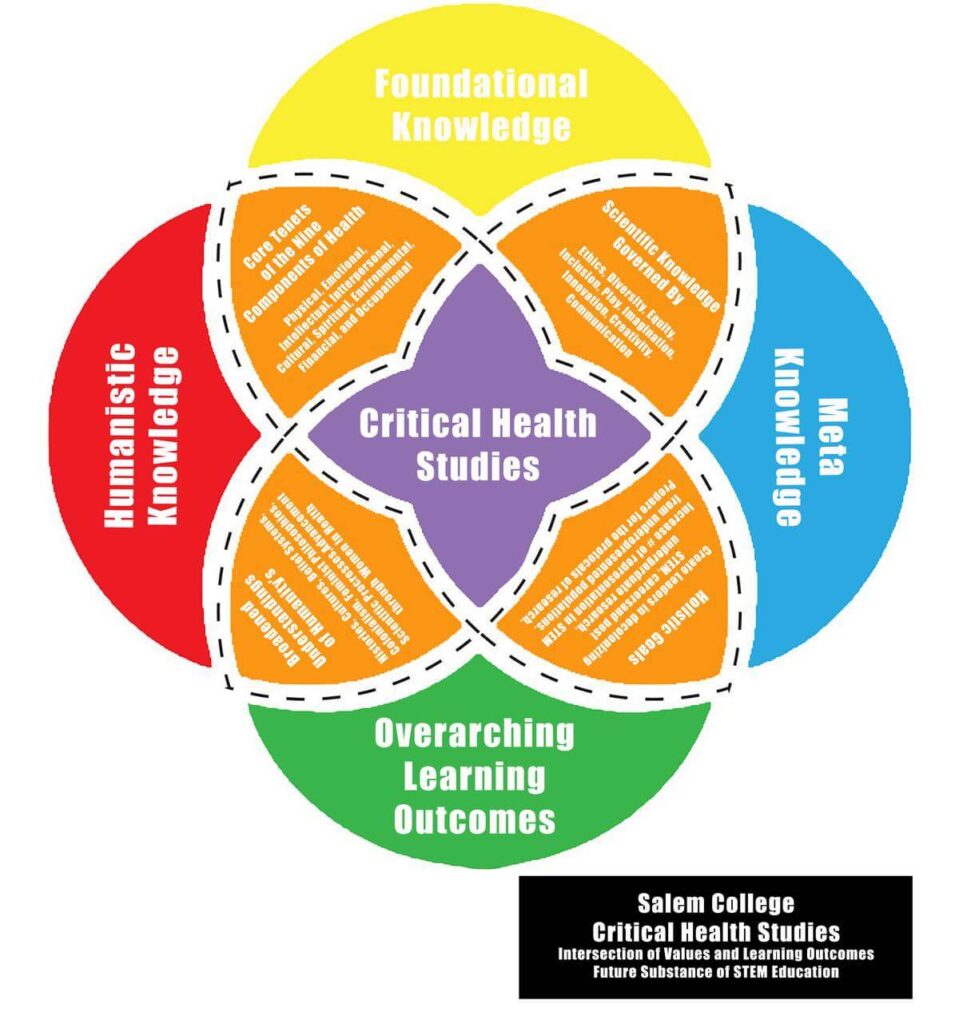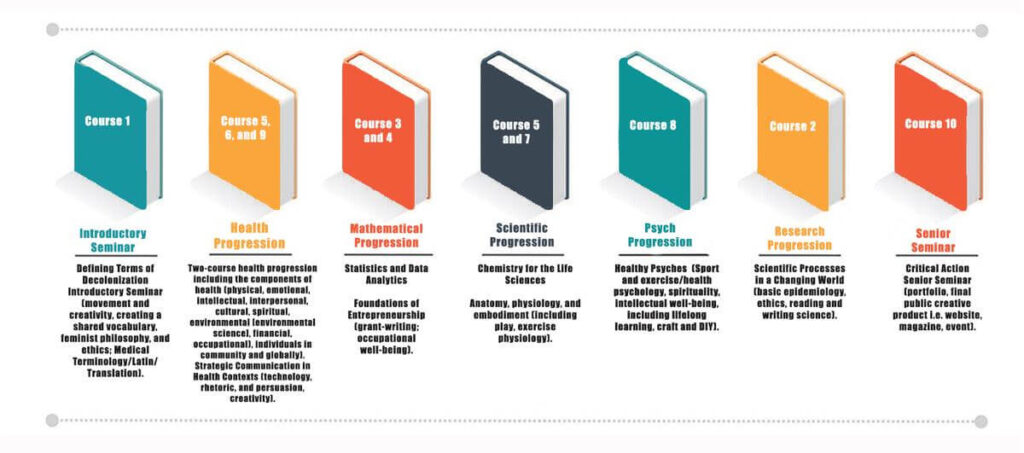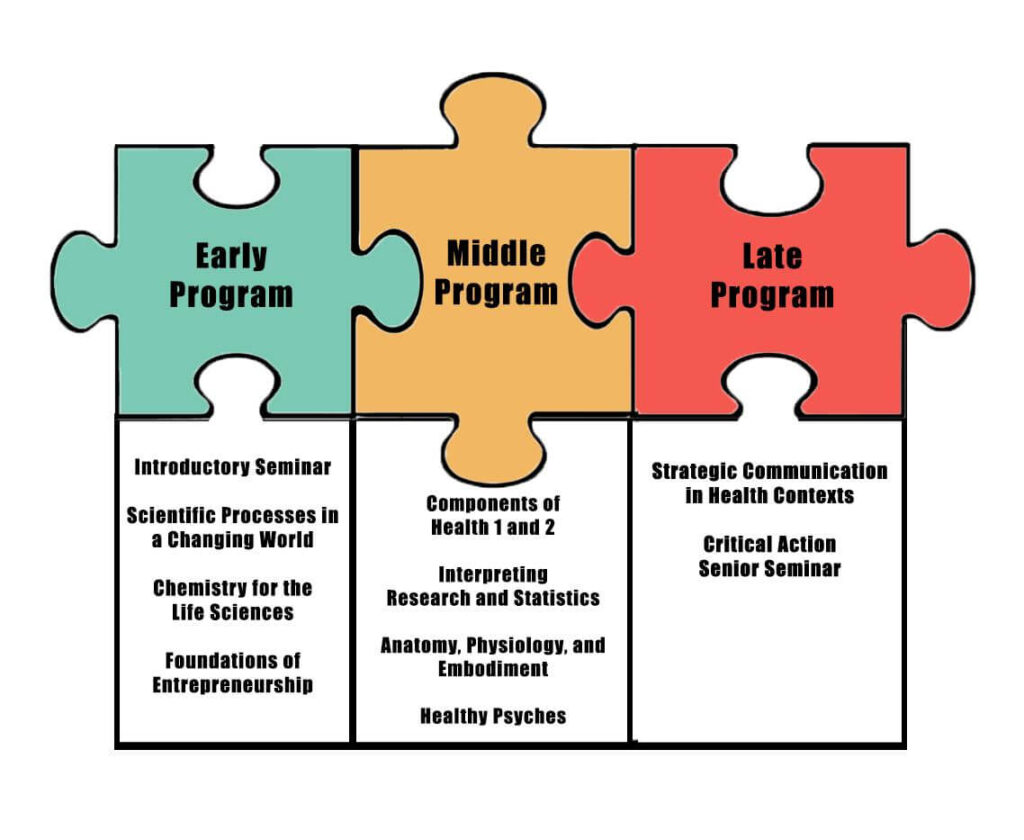Critical Health Studies Undergraduate Degree Program
Erika Bonadio, Salem College; Spring Duvall, Salem College; Katie Manthey, Salem College; Maria Robinson, Salem College; Jing Ye, Salem College
Description
Critical Health Studies
Critical Health Studies is a transdisciplinary major program of co-taught courses that incorporates STEM subjects (biology, biochemistry, environmental science, psychology, and kinesiology), social sciences (anthropology, sociology, communications, entrepreneurship), and humanities (writing, religion, history, arts), related to health and well-being. Students will proceed through the major in a cohort that is book-ended by project-based learning seminars. A meta focus in action research will lead these cohorts in partnerships with community groups to create meaningful interventions to reduce health inequities. The curriculum will model a decolonized course design to promote fundamental values.
We live in a dynamic, complex world, where competing worldviews make it difficult for people to understand each other. The Critical Health Studies program is for students who love sciences, love humanities, and want a meaningful way to combine them. In this program, students develop a multifaceted approach to knowledge and problem-solving that recognizes the value of STEM, social sciences, the humanities, and the arts – essentially allowing them to code-switch in their thought structures and language. Graduates of this program will be equipped to lead in the creation of meaningful interventions to social inequities related to various components of health.
Students who graduate from this program will be prepared to enter careers in advocacy, health and human services, nonprofit organizations, or to attend graduate school.

Foundational Knowledge
Students will evaluate the core tenets of the nine components of health typical of standard higher education curricula (i.e., physical, emotional, intellectual, interpersonal, cultural, spiritual, environmental, financial, occupational) by normalizing alternative lenses of gender, sexuality, race and/or ethnicity, socioeconomic status, etc.
Foundational scientific knowledge includes
- Basic biochemistry in order to understand the issues like nutrition, drugs, and neuron science (an interdisciplinary understanding of mental health, physical health, and how we learn)
- Psychology of health (including developmental and cognitive psychology, processes of change, sport and exercise psychology)
- Environmental science (including clean air, food and water, drugs, solid and hazardous wastes)
- Anatomy and physiology (including exercise physiology)
- Basic epidemiology
- Statistics (interpretation and understanding claims made about health)
Meta Knowledge
- Importance of play and imagination in health and learning.
- Creatively in exploring problems and effectively communicate possible solutions.
- Oral, written, and artistic communication.
Humanistic Knowledge
- Ethics will be incorporated into each course in the major.
- Diversity, equity, and inclusion will be incorporated into every course in the major.
- Inclusion of histories, cultures, and belief systems in order to fully address health futures. Colonial and cultural understandings of health.
- Feminist philosophy of science.
- Scientific processes in a changing world.
- Emphasize women/women’s health/research on women, health, and science.
Goals of the Program
- Promote the core tenets of the nine components of health typical of standard higher education curricula (i.e., physical, emotional, intellectual, interpersonal, cultural, spiritual, environmental, financial, occupational) by normalizing alternative lenses of gender, sexuality, race and/or ethnicity, socioeconomic status, etc.
- Create leaders in decolonizing STEM education, careers, and post undergraduate research.
- Increase the number of underrepresented populations in STEM fields and post undergraduate study.
- Prepare students to use protocols of research in STEM fields and post undergraduate study.
Learning Outcomes
- Learning Outcome 1
Critical Health Literacy: Students will be able to translate information from the key areas of health and physical expression to make recommendations for interventions through research, outreach and teaching. - Learning Outcome 2
Health Communication: Students will be able to consume and produce effective interpersonal and multimedia health communications (marketing, advocacy, impact). - Learning Outcome 3
Interpret Health Related Research:Students will be able to critically analyze, evaluate, and disseminate current health-related research efficiently and effectively. - Learning Outcome 4
Historical Knowledge of Health:Students will be able to employ the knowledge and skills gained by studying the past to understand contemporary issues, to challenge inaccurate or unsupported claims, to make careful comparisons across time, space, and culture, and to take informed positions. - Learning Outcome 5
Social Justice:Students will be able to advocate for social justice in health and action research. - Learning Outcome 6
Solve Real-World Problems:Solve/explore unstructured real-world problems that require teamwork and contributions from diverse disciplines to demonstrate independent learning skills and enthusiasm for the field.
Assessing Program Outcomes
- The program will be assessed with a pre and post evaluation through a yearly community action research event. Students will compile a portfolio of products created over the course of the program that represents foundational, meta, and humanistic knowledge.
- Intro Seminar – Deconstructing Language Around Decolonization
- Statement of Critical Health Values and Projected Goals
- Health Philosophy
- Audio/Visual interview with aspirational figure
- Final cumulative portfolio
- LO1- Critical Health Literacy: Yearly Community Action Research Event/Examples of Statistical and Analytic Studies/Artistic, Creative, Play Products
- LO2- Health Communication: Written Statement of Critical Health Values and Projected Goals/Written Health Philosophy/Multimedia project
- LO3- Interpret Health Related Research: Examples of Statistical and Analytic Studies
- LO4- Historical Knowledge of Health: Deconstructing Language Around Decolonization/Audio-Visual interview with aspirational figure
- LO5- Social Justice: Yearly Community Action Research Event/Producing an Action Product
- LO6- Solve Real-World Problems: Deconstructing Language Around Decolonization/Producing an Action Product/Yearly Community Action Research Event
- Senior Seminar – Producing an Action Product
- Final public creative product (website, magazine, event)
- Intro Seminar – Deconstructing Language Around Decolonization
Critical Health Studies Alignment.docx.pdf (Acrobat (PDF) 67kB Oct25 20)
Courses and Sequencing
The proposed sequence of new and existing courses will prepare students for some of the following career and education paths:


Career Paths with a Critical Health Studies Degree
- Hospital or Physician’s Office: Maybe you’re drawn to a busy hospital environment, where you might field media inquiries, write newsletter articles, and release news to the community. Or you might prefer working in a doctor’s office, where you plan and handle meaningful communications activities on a smaller scale. The critical lens gained from this degree will take into account the research, the practitioner, and the patient as they serve to guide health facilities.
- PR/Advertising/Marketing Firm: You’re likely to manage all of the agency’s health-related clients, serving as the liaison between them and the creative team. As your company’s health services knowledge base, you’ll play a pivotal role planning communications matters using an assortment of media tools with an increased knowledge of underserved populations and equity
- Nonprofit Health Agency: As the resident critical health studies expert, you’ll oversee and implement strategic communications plans that include all populations. You might also be the go-to pro at community engagements, helping educate local citizens and explaining concepts in layman’s terms in an equitable approach.
- Pharmaceutical Company: Here your bachelor’s in critical health studies could help you sift through obscure medical terminology and translate it into understandable language for publication on packaging materials, client manuals, and digital communications on the company website with a critical lens.
- Public/Community Health Sectors: It’s all too common for a health epidemic like the flu to infect a large swath of a city’s population. That’s when you’d step in to help educate the public and alleviate their fears with an understanding of diverse populations. Beyond harnessing your risk-management skills, you’d be a valuable critical health education resource, spearheading community health communications plans and serving as a trusted source for local media representatives. The community health sector provides a unique, growing area of the health care industry. With the right add-on courses, the graduates could consider work as community health educators, coordinators, physician health representatives, outreach specialists.
Retrieved from https://www.waldenu.edu/online-bachelors-programs/bs-in-health-studies/resource/five-interesting-job-settings-for-anyone-in-the-health-communications-field (Revised to include Critical Theory Focus)
Critical Health Studies Course Sequence
Erika Bonadio, Salem College; Spring Duvall, Salem College; Katie Manthey, Salem College; Maria Robinson, Salem College; Jing Ye, Salem College
Sequence of Courses
(physical, emotional, intellectual, interpersonal, cultural, spiritual, environmental, financial, occupational)
General Education
Social Science
Global Studies
Lab Science
Modern Language
Physical Education/Wellness
Gender Inquiry
Mathematics
Core Courses 10-14 courses
Early Program
Introductory Seminar: Decolonization as Theory and Practice
This course functions as an introduction to the critical approach of decolonization that runs through the entire major. Drawing on work from indigenous scholars, feminist philosophy, and ethics, the course aims to create a shared vocabulary and guiding practices for doing the work of decolonization both inside and outside of the academy. Medical terminology will also be introduced.
Scientific Processes in a Changing World
This course will inform students of the scientific process using historical and current case studies drawn from epidemiology and broader STEM fields. We will explore the scientific process of using observations to make hypotheses, ethically and responsibility collecting data to test those hypotheses and form new theories about the determinants of health, and disseminating knowledge to a broad audience. We will explore the ways that contemporary cultural beliefs shape scientific reasoning. The course will emphasize ethical approaches to science and clearly written communication of scientific findings.
Chemistry for the Life Sciences
This course introduces the molecular basis of life. It starts from atoms, moving to organic compounds and how they form molecules in our body such as carbohydrates, proteins, and nucleic acids. It also introduces the chemistry of solutions including sugar, acids, bases, and buffers that are relevant to environmental, food, and health issues. Students will gain a basic understanding of chemistry as it applies to life and health-related sciences after the completion of the course.
Foundations of Entrepreneurship
This course introduces students to entrepreneurial concepts, topics, and terminology. Students will practice professional writing, including grant writing, memos, proposals, and pitches. The course will also focus on maintaining occupational well-being and examining systems of power around entrepreneurship and business.
Middle Program
Components of Health 1 and 2: Students enrolled in this two-course progression will explore the nine components of health (physical, emotional, intellectual, interpersonal, cultural, spiritual, environmental, financial, occupational) from an applied perspective. Students will examine health inequalities and health inequities, and critically analyze personal, community, and global approaches to health.
Interpreting Research and Statistics. Recommendations about health and human behavior, such as what health treatments you should pursue, are based on scientific studies and statistical analysis. But how do researchers get from gathering data in an experiment to claims about what people should do? This course will train students to be informed consumers of research and statistics, with an emphasis on knowing what research methods are necessary to support claims about cause and effect; what statistical significance does (and does not) tell us; when claims can be generalized from a sample to population; and how to interpret effect sizes and interactions, including moderation and mediation.
Anatomy, physiology, and embodiment: This course provides an introduction to the structure and function of the human body, health, and wellbeing, in the context of culture with a focus on embodiment. While human bodies around the world are fundamentally structured and function the same ways, race, class, gender, sexuality, (dis)ability, age, size, and other factors influence how people experience life in their bodies. This course is appropriate for students pursuing both medical and nonmedical fields but cannot be taken in place of BIOL 218 and 219.
Healthy Psyches: In this experiential learning course, students will explore the meaning of mental health over time and across cultures. Potential topics include creativity, physical activity, play, spirituality, compassion, healthy relationships, and lifelong learning. Students will apply theories of behavior change and facilitate goal setting and stress management techniques.
Late Program
Strategic Communication in Health Contexts: Strategic communication includes theories and practices in public relations, advocacy/activism, health communication, marketing communication, investor relations, fundraising, media relations, lobbying, and content marketing. This course introduces students to values-driven approaches that not-for-profit and for-profit organizations can use to more effectively reach their target audiences. Students will learn how to leverage digital media and use analytics to maximize the impact of communication strategies. Class research project on health-related case studies, individual portfolio and oral presentation required. (technology, rhetoric, and persuasion, creativity)
Critical Action Senior Seminar: Seniors majoring in Critical Health Studies will apply transdisciplinary thinking as they work together with community members to identify a local health need, brainstorm potential solutions, and create a product that engages with the mission of decolonization to ethically build a healthy community together. https://www.who.int/alliance-hpsr/resources/alliancehpsr_hpsrreaderpart4_7.pdf?ua=1
References
Fahey, T.D., Insel, P.M., Roth, W.T., Insel, C.E.A. (2017). Fit & well: Core concepts and labs in physical fitness and wellness (12th ed.). McGraw Hill Education.

This material is based upon work supported by the National Science Foundation under Grant #1935479: Workshop on the Substance of STEM Education. Any opinions, findings, and conclusions or recommendations expressed in this material are those of the author(s) and do not necessarily reflect the views of the National Science Foundation.
